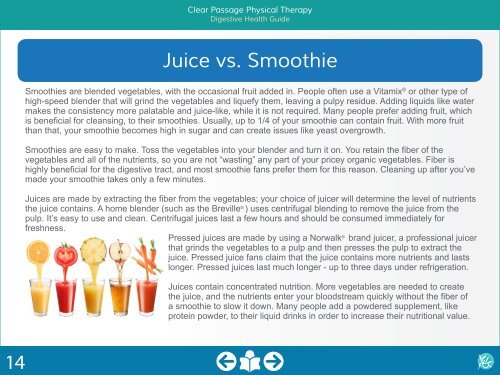Digestive Health Guide for Bowel Obstruction
SBOguide
SBOguide
Create successful ePaper yourself
Turn your PDF publications into a flip-book with our unique Google optimized e-Paper software.
Clear Passage Physical Therapy<br />
<strong>Digestive</strong> <strong>Health</strong> <strong>Guide</strong><br />
Juice vs. Smoothie<br />
Smoothies are blended vegetables, with the occasional fruit added in. People often use a Vitamix ® or other type of<br />
high-speed blender that will grind the vegetables and liquefy them, leaving a pulpy residue. Adding liquids like water<br />
makes the consistency more palatable and juice-like, while it is not required. Many people prefer adding fruit, which<br />
is beneficial <strong>for</strong> cleansing, to their smoothies. Usually, up to 1/4 of your smoothie can contain fruit. With more fruit<br />
than that, your smoothie becomes high in sugar and can create issues like yeast overgrowth.<br />
Smoothies are easy to make. Toss the vegetables into your blender and turn it on. You retain the fiber of the<br />
vegetables and all of the nutrients, so you are not “wasting” any part of your pricey organic vegetables. Fiber is<br />
highly beneficial <strong>for</strong> the digestive tract, and most smoothie fans prefer them <strong>for</strong> this reason. Cleaning up after you’ve<br />
made your smoothie takes only a few minutes.<br />
Juices are made by extracting the fiber from the vegetables; your choice of juicer will determine the level of nutrients<br />
the juice contains. A home blender (such as the Breville ® ) uses centrifugal blending to remove the juice from the<br />
pulp. It’s easy to use and clean. Centrifugal juices last a few hours and should be consumed immediately <strong>for</strong><br />
freshness.<br />
Pressed juices are made by using a Norwalk ® brand juicer, a professional juicer<br />
that grinds the vegetables to a pulp and then presses the pulp to extract the<br />
juice. Pressed juice fans claim that the juice contains more nutrients and lasts<br />
longer. Pressed juices last much longer - up to three days under refrigeration.<br />
Juices contain concentrated nutrition. More vegetables are needed to create<br />
the juice, and the nutrients enter your bloodstream quickly without the fiber of<br />
a smoothie to slow it down. Many people add a powdered supplement, like<br />
protein powder, to their liquid drinks in order to increase their nutritional value.<br />
14


